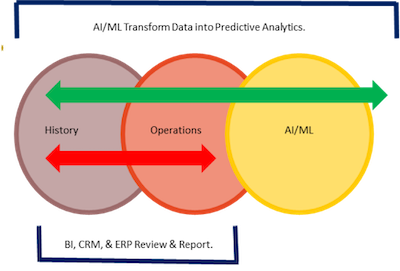AI tech will change the wholesale distribution game ... do you have a playbook?
By Nelson Valderrama
So, I was out for lunch, and I overheard people arguing about AI. Their argument settled nothing.

But, it convinced me that AI and machine learning (ML) present significant operational and cultural challenges for wholesale distributors. As a decision-maker, you must:
- Have a clear vision of the applications that match your business goals.
- Select the right AL/ML model for your goals.
- Partner with your tech provider to prepare a playbook that delivers win-win results.
- Determine how to integrate these new technologies into your existing workflows and
- Train users and interested functions.
It's a lot to handle. But done right, it could be a game-changer for your business!
Okay, it may take some time, but management decision-makers must wrap their heads around the AI/ML topic and start preparing the playbooks their teams need to win.
The Tip of an Iceberg
OpenAI surprised the public in 2022. It scours the Internet for the language to answer questions, define complex terms, and frame arguments. Using internet resources, it will write business plans and proposals.
The AL/ML technologies used in distribution drive other processes. They consume large databases, creating predictive analytics for inventory and pricing optimization. Or consider what extra value your salespeople could extract from the ERP and CRM with tools proposed by leading vendors.
Wholesale distributors have a treasure trove of data at their fingertips. From the small purchases of office supplies to the high-volume buy of industrial goods that you will later sell, your every transaction creates a wealth of valuable information.
But it's not just purchases that generate data. Distributors also track receivables, payables, and other customer behaviors. In fact, every business action and gesture creates data.
Distributors rely on multiple systems to gather the data. Each produces easily accessed and managed digital data. However, I worry about the data entered on paper spreadsheets, jotted on stick-up notes, or stored in the minds of seasoned employees. While the digital database is secure, we cannot always depend on the "tribal knowledge" and instincts of those who rely on manual records.
Given AI’s power to explore and leverage a distributor’s transactional history, questions remain:
- What do we intend to do with it? What applications will reach our business goals?
- How do we intend to use it? What playbooks show how to win?
- How do we shop and buy? What should we look for in an AI/ML provider?
I’ll try to answer your questions so you can adopt and adapt new superpowers!
What’s Your Plan, What’s Your Play?
The economy's got its groove back! Inflation's finally chilling out, and the Fed might soon loosen its grip on interest rates. We still hear whispers of recession, but experts predict it'll be mild and brief. Sure, some bumps remain – high prices and geopolitical jitters might disrupt your supply chains.
But the good news? Onshoring manufacturing is rising, construction is booming, and the U.S. infrastructure's getting a multi-billion-dollar makeover.
- PwC (2017) forecasted a 14% boost in U.S. GDP by 2030 across all economic sectors, with the most significant gains in productivity, product quality, and consumption.
- McKinsey (2018) offered a parallel analysis.
Savvy distributors hear opportunity knocking! AI and machine learning are your new best friends, ready to optimize your inventory and pricing like nobody's business.
Think of your IT infrastructure as a city. In its early days, it might have been a quaint village with a basic help desk acting as the town hall. But as your business grew, you added new buildings (applications) here and there, sometimes venturing into the suburbs (cloud solutions).
Initially, the setup served its purpose, but unplanned expansion can lead to a disjointed and inefficient system – a tech sprawl that hinders progress.
IT to the Rescue
But there comes a time when you turn to your IT leader for direction. They’re no longer just the folks who fix printers and reset passwords. They have become strategic partners and architects of your digital future. They're the city planners, the engineers, the visionaries who understand the intricate connections between technology and business goals.
Sure, they'll still handle the day-to-day operations, ensuring everything runs smoothly (think traffic lights, power grids, and efficient waste management). But their expertise goes beyond the nuts and bolts. They constantly scan the horizon for emerging technologies, identifying the ones that can revolutionize your business and advising on integrating them seamlessly into your existing infrastructure.
So, it's time to ditch the patchwork IT and embrace strategic technologies. They'll help you navigate the ever-evolving tech landscape, ensuring your business thrives in the digital age. Remember, a well-planned, efficient city attracts investment, fosters innovation, and paves the way for a prosperous future. The same holds for your business!
Your CIO can offer the best advice on what AI/ML will do for your B2B distribution. You need a clear vision of the applications your business needs and a playbook to deliver win-win results.
Writing for Harvard Business Review (Sept. 20, 2022), Alyssa Merwin warned that sales leaders have a data problem; “the core issues are over-reliance on stale data, imprecise buying signals, and limited coverage of prospects.”
- Purchasing: AI can improve product procurement with its access to deep data. Algorithms will analyze historical sales data, seasonal patterns, and external factors to predict future product demand. This helps distributors optimize inventory levels, reduce excess stock, and avoid stockouts.
- Automation: AI can automate the purchase order process, reducing manual effort and minimizing errors.
- Relationships: AI can access supplier performance history, including delivery times, customer returns, and contracts with buyers and sellers. It can suggest optimal negotiations with favorable pricing and terms.
- Forecasting: Business Intelligence (BI), Customer Relation Management (CRM), and Enterprise Resource Planning (ERP) systems focus on the past and present. They report what’s happening or what’s been going on.
AI/ML will drive the future. The image below suggests how these technologies relate to each other. A robust BI system will review historical data and current operations to report on pain points and key performance indicators. It draws a good picture of how things are going today compared to similar reports with previous results.
AI “knows” everything that BI “knows.” AI searches the same transactional history. But it forms a more holistic understanding of the data. AI “understands” customer decisions and integrates those behaviors with economic, market, and competition trends. The resulting predictive analytics drive pricing and inventory management.
As the figure shows, AI/ML pushes forward while other business software reviews the past.

- Sales: Writing for Harvard Business Review (Sept. 20, 2022), Alyssa Merwin warned that sales leaders have a data problem; “the core issues are over-reliance on stale data, imprecise buying signals, and limited coverage of prospects
Advanced technologies analyze customer interactions, historical sales data, and relevant patterns to identify and prioritize sales leads. Sales teams can focus on pitching those with higher conversion potential.
AI research will recommend additional products or upsell opportunities that personalize the customer experience, drive additional sales, and increase average order values.
AI/ML-driven processes support all these applications, although you may prefer to prioritize one or more goals.
Shopping for Your Solution
You can’t buy an AI/ML system off the shelf at Staples or Office Depot. You won’t find it on Amazon or a pre-owned version on eBay. So, when investing in advanced technology, consider these five issues:
- Industry expertise: Finding the perfect match for wholesale distribution is like assembling your dream team. As in sports, distributors tackle unique challenges, demands, and chances that call for a partner with industry expertise.
Before committing, scouting an AI vendor's track record in executing successful system implementations is essential. Think of it as checking a team's stats before signing them onto your roster. Take it a step further by connecting with other players in the game – read client testimonials and references.
And for that ultimate scouting experience, consider visiting one of their installations. It's like attending a live game to see how they perform and chatting with the players. By doing your homework, you'll ensure you're drafting a winning team for your distribution needs!
- Utility: AI isn't a one-size-fits-all solution! You'll need a flexible system that can adapt to your current and future needs. It must also be scalable, capable of supporting your business as it grows.
And, of course, nobody wants unnecessary disruptions. That's why you'll want your AI/ML model to integrate effortlessly with your existing BI, ERP, CRM, and inventory management applications. Think of it as ensuring a smooth and harmonious tech ecosystem for your business.
- Performance: A successful distributorship runs like a fine machine. Think of AI/ML as a crucial engine component with several functions. Like any well-oiled machine, management requires training–not just for the system but also for the end users.
Now, let's talk user experience. The system should feel as familiar as a well-organized boardroom meeting for your sales, inventory, finance, and management teams. It's not just about being easy to use; it's about finding an AI/ML provider who is a guiding consultant, ensuring your team seamlessly adapts to the new tools. In the world of business, after all, success lies in efficiency and adaptability.
- Security: It's common for wholesale distributors to crunch numbers with a cost/benefit analysis. The smaller distributors might be there later, but there are those initial costs and ongoing maintenance and support expenses to consider. But let me tell you, the investment return is worth a second look.
This analysis is not just about the numbers; it's a chance to double-check security measures and ensure regulatory compliance. After all, you can't afford to play fast and loose with customer, product, and pricing information. Your company holds the keys to its intellectual kingdom, which you want to maintain.
- Talent: AI/ML will change the nature of work. It will reduce administrative tasks significantly. For example, salespeople will be relieved of manual work and record-keeping to focus on building relationships.
This shift in work and accountability will allow employees and managers to collaborate on defining future work and developing the talents required to continue the innovation.
As an experienced AI/ML provider, I coach interested wholesale distributors to examine these issues. You can’t make an informed decision without testing how well the AI/ML aligns with your business goals.
 Nelson Valderrama, CEO of Intuilize, is a skilled data-driven strategist focused on boosting profits for mid-size distributors. With 25-plus years of experience in all aspects of the wholesale industry, Valderrama continues to support businesses in discovering hidden competitive advantages and leveraging data's potential in the modern Digital Economy. He can be reached at nelson@intuilize.com.
Nelson Valderrama, CEO of Intuilize, is a skilled data-driven strategist focused on boosting profits for mid-size distributors. With 25-plus years of experience in all aspects of the wholesale industry, Valderrama continues to support businesses in discovering hidden competitive advantages and leveraging data's potential in the modern Digital Economy. He can be reached at nelson@intuilize.com.













